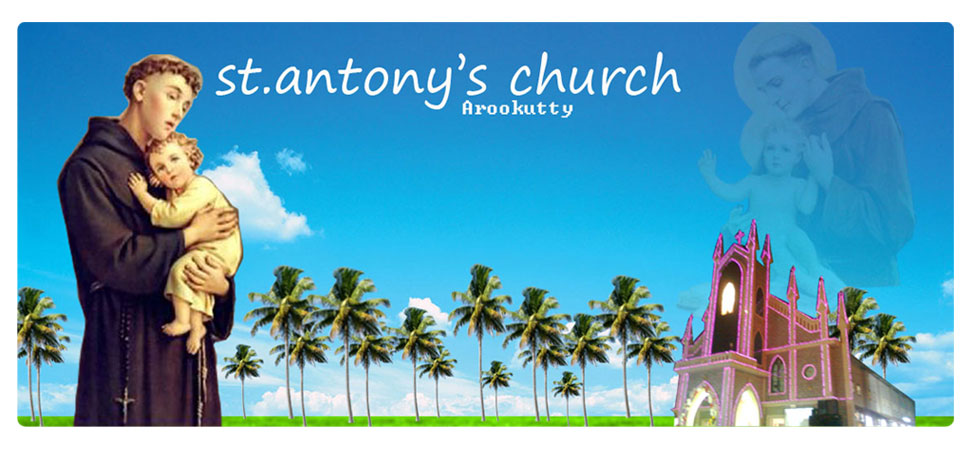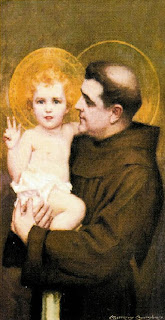ST ANTONY'S CHURCH (estd. 1978)
കൊച്ചി രൂപതയിലെ ഏറ്റവും പുരാതനവും പ്രശസ്തിയും ഉള്ള പള്ളിയാണ്സെന്റ്ആന്റ്റ്ണിസ്.കൈതപ്പുഴ കായലിന്റെ മടിത്തട്ടില് പള്ളി സ്ഥാപിതമായത്1978ആണ്.ഇപ്പോഴത്തെ പള്ളി വികാരി Fr.Sebastian Puthenpurackal ആണ്.
ഫെബ്രുവരി മാസത്തിലെ മുന്നാമത്തെ ഞായറാഴ്ചയാണ് പെരുനാള് .
Anthony of paduva
Fernando Martins de Bulhões, who later, upon admission into the Franciscan Order, would take up the name António (Anthony), was born in Lisbon to Martim Vicente de Bulhões and Teresa Pais Taveira (brother of Pedro Martins de Bulhões, ancestor of the Bulhão or Bulhões family), in a very rich family of the nobility who wanted him to become educated; however, these were not his wishes. His family arranged sound education for him at the local cathedral school. Against the wishes of his family, he entered the Augustinian Abbey of St. Vincent on the outskirts of Lisbon. The Canons Regular of St. Augustine, of which he was a member, were famous for their dedication to scholarly pursuits. Anthony studied Scripture and the Latin classics.
fter his ordination, Anthony was placed in charge of hospitality in his abbey. In this role, in 1219, he came in contact with five Franciscans who were on their way to Morocco to preach to the Muslims there. Anthony was strongly attracted to the simple Gospel lifestyle of the Franciscan friars. In February 1220, news arrived that the five Franciscans had been martyred in Morocco. Anthony meditated on the heroism of these Franciscans. He wanted to obey God's call to leave everything and follow Him. Anthony obtained permission from his Augustinian superiors to join the Franciscan Order.
On the return trip to Portugal, his ship was driven by storm upon the coast of Sicily and he landed at Messina. From Sicily he made his way to Assisi and sought admission into a monastery in Italy, but met with difficulty on account of his sickly appearance. He was finally assigned, out of pure compassion, to the rural hospice of San Paolo near Forlì, Romagna, Italy, a choice made after considering his poor health. There he appears to have lived as a hermit and was put to work in the kitchen.
One day, on the occasion of an ordination, when a great many visiting Dominican friars were present, there was some misunderstanding over who should preach. The Franciscans naturally expected that one of the Dominicans would occupy the pulpit, for they were renowned for their preaching; the Dominicans, on the other hand, had come unprepared, thinking that a Franciscan would be the homilist.In this quandary, the head of the hermitage, who had no one among his own humble friars suitable for the occasion, called upon Anthony, who he suspected was most qualified, and engineered him to speak whatever the Holy Spirit should put into his mouth. Anthony objected but was overruled, and his sermon created a deep impression. Not only his rich voice and arresting manner, but the entire theme and substance of his discourse and his moving eloquence, held the attention of his hearers.
At that point, Anthony was commissioned by Brother Gratian, the minister provincial, to preach the Gospel throughout the area of Lombardy, in northern Italy. From then on his skills were used to the utmost by the Church. Occasionally he took another post, as a teacher, for instance, at the universities of Montpellier and Toulouse in southern France, but it was as a preacher that Anthony revealed his supreme gift.
In 1226, after attending the Franciscan chapter at Arles, France, and preaching in the French region of Provence, Anthony returned to Italy and served as envoy from the general chapter to Pope Gregory IX. At the Papal court, his preaching was hailed as a "jewel case of the Bible" and he was commissioned to produce "Sermons for Feast Days."
Anthony became ill with dropsy and, in 1231, went to the woodland retreat at Camposampiero with two other friars for a respite. There Anthony lived in a cell built for him under the branches of a walnut tree. Saint Anthony died on the way back to Padua on 13 June 1231 at the Poor Clare convent at Arcella, aged 36.
When he died, it is said that the children cried in the streets and that all the bells of the churches rang of their own accord, rung by angels come to earth to honour the death of the saint. He is buried in a chapel, and to this day his tongue is in a reliquary, and is incorrupt although he is not an incorruptible. The tongue glistens and looks as if it is still alive and moist
കൊച്ചി രൂപതയിലെ ഏറ്റവും പുരാതനവും പ്രശസ്തിയും ഉള്ള പള്ളിയാണ്സെന്റ്ആന്റ്റ്ണിസ്.കൈതപ്പുഴ കായലിന്റെ മടിത്തട്ടില് പള്ളി സ്ഥാപിതമായത്1978ആണ്.ഇപ്പോഴത്തെ പള്ളി വികാരി Fr.Sebastian Puthenpurackal ആണ്.
ഫെബ്രുവരി മാസത്തിലെ മുന്നാമത്തെ ഞായറാഴ്ചയാണ് പെരുനാള് .
Anthony of paduva
Fernando Martins de Bulhões, who later, upon admission into the Franciscan Order, would take up the name António (Anthony), was born in Lisbon to Martim Vicente de Bulhões and Teresa Pais Taveira (brother of Pedro Martins de Bulhões, ancestor of the Bulhão or Bulhões family), in a very rich family of the nobility who wanted him to become educated; however, these were not his wishes. His family arranged sound education for him at the local cathedral school. Against the wishes of his family, he entered the Augustinian Abbey of St. Vincent on the outskirts of Lisbon. The Canons Regular of St. Augustine, of which he was a member, were famous for their dedication to scholarly pursuits. Anthony studied Scripture and the Latin classics.
fter his ordination, Anthony was placed in charge of hospitality in his abbey. In this role, in 1219, he came in contact with five Franciscans who were on their way to Morocco to preach to the Muslims there. Anthony was strongly attracted to the simple Gospel lifestyle of the Franciscan friars. In February 1220, news arrived that the five Franciscans had been martyred in Morocco. Anthony meditated on the heroism of these Franciscans. He wanted to obey God's call to leave everything and follow Him. Anthony obtained permission from his Augustinian superiors to join the Franciscan Order.
On the return trip to Portugal, his ship was driven by storm upon the coast of Sicily and he landed at Messina. From Sicily he made his way to Assisi and sought admission into a monastery in Italy, but met with difficulty on account of his sickly appearance. He was finally assigned, out of pure compassion, to the rural hospice of San Paolo near Forlì, Romagna, Italy, a choice made after considering his poor health. There he appears to have lived as a hermit and was put to work in the kitchen.
One day, on the occasion of an ordination, when a great many visiting Dominican friars were present, there was some misunderstanding over who should preach. The Franciscans naturally expected that one of the Dominicans would occupy the pulpit, for they were renowned for their preaching; the Dominicans, on the other hand, had come unprepared, thinking that a Franciscan would be the homilist.In this quandary, the head of the hermitage, who had no one among his own humble friars suitable for the occasion, called upon Anthony, who he suspected was most qualified, and engineered him to speak whatever the Holy Spirit should put into his mouth. Anthony objected but was overruled, and his sermon created a deep impression. Not only his rich voice and arresting manner, but the entire theme and substance of his discourse and his moving eloquence, held the attention of his hearers.
At that point, Anthony was commissioned by Brother Gratian, the minister provincial, to preach the Gospel throughout the area of Lombardy, in northern Italy. From then on his skills were used to the utmost by the Church. Occasionally he took another post, as a teacher, for instance, at the universities of Montpellier and Toulouse in southern France, but it was as a preacher that Anthony revealed his supreme gift.
In 1226, after attending the Franciscan chapter at Arles, France, and preaching in the French region of Provence, Anthony returned to Italy and served as envoy from the general chapter to Pope Gregory IX. At the Papal court, his preaching was hailed as a "jewel case of the Bible" and he was commissioned to produce "Sermons for Feast Days."
Anthony became ill with dropsy and, in 1231, went to the woodland retreat at Camposampiero with two other friars for a respite. There Anthony lived in a cell built for him under the branches of a walnut tree. Saint Anthony died on the way back to Padua on 13 June 1231 at the Poor Clare convent at Arcella, aged 36.
When he died, it is said that the children cried in the streets and that all the bells of the churches rang of their own accord, rung by angels come to earth to honour the death of the saint. He is buried in a chapel, and to this day his tongue is in a reliquary, and is incorrupt although he is not an incorruptible. The tongue glistens and looks as if it is still alive and moist


